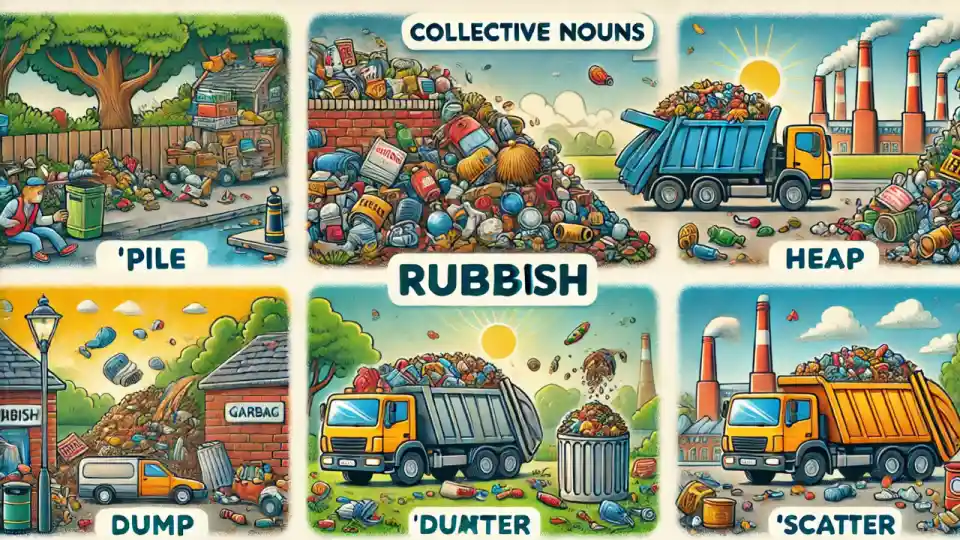Rubbish, also known as waste or garbage, is an unavoidable part of modern life. While we often think of it as an individual mess rubbish can also accumulate in groups and there are creative collective nouns to describe it. These terms highlight the state size or placement of rubbish in different contexts. Let us explore the collective nouns for rubbish along with examples to bring them to life.
Collective Nouns for Rubbish in Table
Here are some common and imaginative collective nouns used for rubbish:
| Collective Noun | Meaning |
|---|---|
| Pile | A small or organized stack of rubbish |
| Heap | A larger, often disorganized collection |
| Dump | A designated location where rubbish is stored |
| Scatter | Rubbish spread out haphazardly over an area |
| Load | A large amount of rubbish being transported |
Detailed Explanations and Examples for Rubbish
1. Pile
A pile refers to a small somewhat organized stack of rubbish often temporary.
- Example 1: A pile of rubbish was left on the curb for collection.
- Example 2: Workers gathered the debris into a neat pile of rubbish by the roadside.
- Example 3: The wind scattered the pile of rubbish, spreading it across the street.
2. Heap
A heap describes a larger, often messy and disorganized accumulation of rubbish.
- Example 1: A heap of rubbish blocked the alleyway after the storm.
- Example 2: The landfill was filled with heaps of rubbish stretching across the horizon.
- Example 3: After cleaning the yard, they ended up with a huge heap of rubbish.
3. Dump
A dump refers to a designated location where rubbish is stored or disposed of permanently.
- Example 1: The old dump was an eyesore on the edge of town.
- Example 2: He took the broken furniture to the rubbish dump on Saturday morning.
- Example 3: A dump of rubbish in the forest became a concern for local wildlife.
4. Scatter
Scatter refers to rubbish that has been spread loosely over an area, often by wind or neglect.
- Example 1: A scatter of rubbish lined the park after the weekend festival.
- Example 2: The scatter of rubbish across the beach was cleaned up by volunteers.
- Example 3: Strong winds turned the trash bin’s contents into a scatter of rubbish.
5. Load
A “load” describes a large quantity of rubbish, often being transported for disposal.
- Example 1: The truck carried a heavy load of rubbish to the recycling center.
- Example 2: After the cleanup, the volunteers hauled several loads of rubbish away.
- Example 3: Each week, the city removes countless loads of rubbish from the streets.
Conclusion
Rubbish is an inevitable part of life, but how we handle it matters. The collective nouns for rubbish such as pile, heap and scatter help us describe its size placement or state. Whether it is a neat pile on the curb or a scattered mess after a storm these terms remind us of the importance of proper waste management and keeping our surroundings clean.
